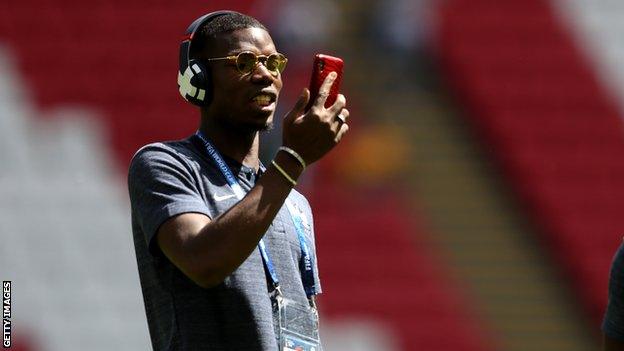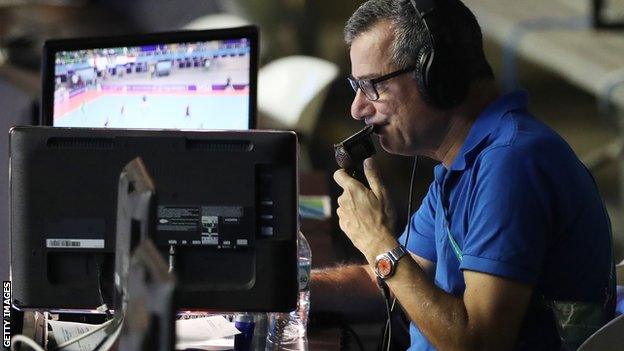Players deleting social media accounts because of 'barrage' of negativity - PFA
- Published

Paul Pogba has 57m followers across social media channels Instagram, Facebook and Twitter
Football players are starting to reject social media because of the stress it can cause, according to the Professional Footballers' Association.
The number of players accessing the PFA's counselling services rose to a record 643 in 2019, up almost 50% on the previous year.
PFA director of player welfare Michael Bennett said social media meant there was "no escape from football".
"I've spoken to players who've deleted their accounts," he told BBC Sport.
"That's just because of the barrage they get.
"You think about it, some of these players have 50, 60, 100,000 followers, and if you're getting negative feedback from a large proportion of those individuals, it's going to affect you."
BBC Sport has been told of high-profile players who let other people update their accounts to avoid abuse.
Manchester United's Paul Pogba and Marcus Rashford have huge social media followings but were subjected to racism on social media earlier this season.
Last April professional footballers boycotted social media for 24 hours to protest against the way networks and football authorities had responded to racial taunts.
Roma defender Chris Smalling, who is on loan from Manchester United, said that he had witnessed some players taking a break from using social media.
He told BBC Sport: "I wasn't on it until a few years ago, I was generally a private person and then I saw it and a lot of the good things that come from it.
"But it's something where you need to manage your time because it's very addictive.
"You see some players taking a break from it because it can get a lot. You will get good and bad messages however well you are doing."
Former commentator and now sports psychotherapist Gary Bloom said social media was something players "crave and hate".
Bloom is employed by Oxford United and also works with a number of professional players in the game.
Speaking at a football psychotherapy conference at the team's Kassam Stadium, he said: "The big sportswear manufacturers will often set a certain number of followers on social media before they give players certain deals, so a lot of players are chasing those margins.
"At the same time those social keyboard warriors turn up and complain, so what do you want to do? It's craving something that is poisoning you."

Gary Bloom is a former commentator but is now a trained psychotherapist and works with Oxford United
'Football 10-15 years behind cricket and rugby union'
Bennett said the rise in players accessing the PFA's services was in part down to better awareness of mental health and a willingness to talk about it.
In 2016, 160 players used the PFA's counselling services, jumping to 403 in 2017. In 2018 it reached 438.
The PFA has more than 200 counsellors across England which players can access, but Bennett admits clubs could do more to support players and said that gambling had become a big issue.
The former Charlton, Wimbledon and Brentford winger added: "Issues might include a bereavement in the family, or living away from family, or long-term injury or not being in your manager's plans, or not earning the money you used to.
"All this stuff can impact individuals and lead to issues. Gambling is also having a big impact on people because it's so easy to access these days."
But Bloom said that football was "10-15 years behind" other sports like cricket and rugby union when it came to player welfare.
He hoped that the conference would help educate clubs about the benefits of having a sports psychotherapist embedded with the team, and how it differed from sports psychology.
"Sports psychology has traditionally been about on-the-field issues, about graphs and data," he said. "Sports psychotherapy is more about looking after the human being and building relationships and not trying to fix things but getting the individual to look at their personal problems off the field.
"Cricket and rugby are way in advance of football. Football is still in the Neanderthal age at times, you would think in 2020 some of these issues would be addressed. The majority of the people at the conference are from academies so that gives me hope that in the next 10-15 years attitudes will change.
"But I'm counselling and a psychotherapist to many elite footballers that tell me that problems with bullying, homophobia and racism occur as much today as they ever have done.
"There is a huge amount of work to do and thankfully, there will be more and more people like me embedded in football clubs and we can normalise those coffee machine chats and get away from the stigma of having a psychotherapist in clubs means there is something wrong."